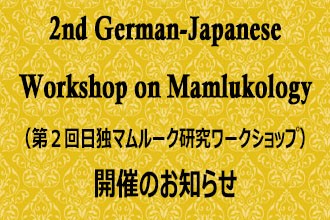2nd German-Japanese Workshop on Mamlukology(第2回日独マムルーク研究ワークショップ)開催のお知らせ
2018年12月1日(土)~2日(日)にかけて、早稲田大学戸山キャンパスで、2nd German-Japanese Workshop on Mamlukology (co-organized by Tetsuya Ohtoshi and Stephan Conermann)を開催いたします。
日時:12月1日(土)13:00-、12月2日(日)9:30-17:40
会場:早稲田大学戸山キャンパス33号館16階第10会議室
使用言語:英語
主催 : 早稲田大学文学部・文学学術院「中東・イスラーム研究コース」、早稲田大学イスラーム地域研究機構、ボン大学(ドイツ)
共催 : 科研基盤B「13-
参加費:不要
ご参加いただける方は、予め以下までご連絡いただけると助かります。
mideast-islam(a)list.waseda.jp (a)は@に御変更ください。
☆プログラムを一部変更いたしました(11/12)
***********************************************************
2nd German-Japanese Workshop on Mamlukology
December 1, Saturday
13:00-13:10 Opening Address by Tetsuya Ohtoshi (Waseda University)
13:10-15:25 Session 1: Case Studies on Individual Intellectuals
13:10-13:40
Stephan Conermann (University of Bonn), “Some Considerations on Ibn Jamāʿa’s (d. 1341) Tadhkirat al-sāmiʿ wal-mutakallim fī adab al-ʿālim wal-mutaʿallim”
13:40-14:10
Abdelkader Al Ghouz (University of Bonn), “Not That Simple: al-Bayḍāwī’s Contribution to the Process of Naturalizing Peripatetic Philosophy in Dialectic Theology: Cosmology as a Case Study”
14:10-14:25 Coffee Break
14:25-14:55
Yuta Arai (Waseda University), “Rethinking Ibn Khaldūn’s Perspective on “Change” of Historical Circumstances: Theorization and Description”
14:55-15:25
Anna Kollatz (University of Bonn), “Tracing Ibn Iyās‘ Narrative: Shajar ad-Durr from ʿUqūd al-jumān to Badāʾiʿ az-zuhūr”
15:25-15:40 Coffee Break
15:40 – An Arabic Republic of Letters in the Middle Ages? Intellectual Networks between the Maghrib and the Mashriq (Panel organized by Takao Ito)
15:40-15:50 Introduction by Takao Ito (Kobe University)
15:50-16:20
Alex Mallett (Waseda University), “Spain, Sicily, Syria: Muslim Explanation for the First Crusade”
16:20-16:50
Ayumi Yanagiya (Toyo Bunko), “Private Letter Exchange of Intellectuals in Medieval Arabic World: Focusing Mainly on al-Qadi al-Fadil and Imad al-Din al-Isfahani”
16:50-17:10 Coffee Break
17:10-17:40
Kentaro Sato (Hokkaido University), “Maghribi Tradition of Knowledge in Mamluk Cairo: An Analysis of Isnād of Ibn Khaldūn”
17:40-18:10
Takao Ito (Kobe University), “Writing a Biography of Ibn Khaldūn”
18:10 – Discussion
December 2, Sunday
9:30-10:30 Session 2 Mamluk Dynasty and Its Rule
9:30-10:00
Erina Ota-Tsukada (Keio University/Tokyo University of Foreign Studies), “Banū Muzhir and Marriage as a Family Strategy”
10:00-10:30
Hidenori Teshima (Chuo University), “The Promotional Steps of Influential Amirs in the Late Mamluk Dynasty: The Study of Career of Government Officials under the Reign of Sultan al-Ashraf Qāytbāy”
10:30-10:45 Coffee Break
10:45-12:15 Session 3 Networks and the Mobility of Ideas and Individuals
10:45-11:15
Kaori Otsuya (University of Liège/Kyoto University), “Places of Origin of Scholars Who Visited Mecca and Medina in the Bahri Mamluk Period”
11:15-11:45
Mohammad Gharaibeh (University of Bonn), “The Sociology of Commentarial Literature. An Analysis of the Commentary Tradition of the Muqaddima of Ibn aṣ-Ṣalāḥ (d. 643/1245) from the Perspective of the Sociology of Knowledge”
11:45-12:15
Manami Kondo (Ryukoku University), “Taqīy al-Dīn al-Subkī and the Society in Damascus”
12:15-13:30 Lunch
13:30-15:00 Session 4 Society and Environment as seen from the Documents
13:30-14:00
Ryosuke Kubo (Hitotsubashi University), “Management and Administration of a Waqf Facility in Mamluk Cairo: Who were the Beneficiaries?”
14:00-14:30
Bethany J. Walker (University of Bonn), “Agricultural Terracing and Gardening for Profit: Transformation of Palestinian Landscapes in the Mamluk Period”
14:30-15:00
Tetsuya Ohtoshi (Waseda University), “Some Reflections on the Functioning of Waqfs that Provided for Egyptian Cemeteries”
15:00-15:15 Coffee Break
15:15-16:25 Free Talks
– Toshimichi Matsuda (Chuo University), “Court Records in the Mamluk Period: The Case of Maḥdar”
– Manabu Kameya (Hirosaki University)
– Junichi Taniguchi (Kyoto Women’s University)
– Takenori Yoshimura (Daito Bunka University)
16:25-16:40 Coffee Break
16:40-17:10 General Discussion
17:10-17:40 Concluding Remarks by Stephan Conermann
【終了しました】2nd German-Japanese Workshop on Mamlukology(第2回日独マムルーク研究ワークショップ)開催のお知らせ(12/1-2)

